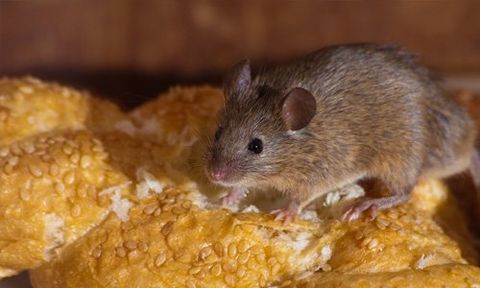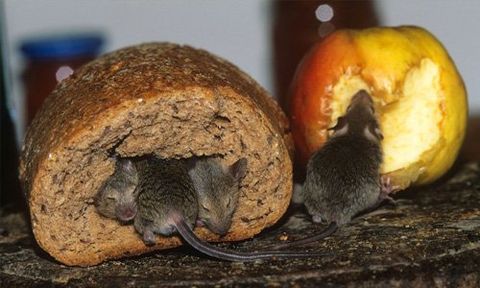Mice control in Eastleigh, Southampton, Hampshire and Wiltshire
Do you want an expert to get rid of mice in your property? Get in touch with Latham Pest Control for services in Eastleigh and Southampton.
Contact us
Trusted mice control
Over 25 years, our experts have gained experience in putting an end to mouse problems in Eastleigh and Southampton. Our experts are familiar with the traits that mice have, and this makes their work a little easier. With our high quality work, we have earned the trust of our clients. For more information, contact our team today.

What attracts mice and how do you know you a mouse problem?
- What really attracts mice? In a word: food. Mice are good at finding any scrap of food in and around your home, but they mainly look for:
- Uncollected rubbish and litter
- Food for pets and birds that has been left out and not eaten
- Fruits and berries that have fallen to the ground
- Untended compost piles
- Discarded food
And how do you know that you have a mouse problem? You will know that you’ve got a mouse problem when you see, hear or smell:
- Droppings (typically around five millimetres long) found near food sources. Mice can produce up to 80 a day.
- Scratching noises
- Evidence of chewed fabric or items
- Burrows or a nest
- You may also notice a strong musky odour

Why choose our mice control services?
Our experts have gained experience in offering mouse control services to customers in Eastleigh and Southampton. We make use of different techniques to ensure that your property is free of mice. In addition to our mice control services, we also offer pest control, wasp control, rat control, ant control, bed bug control, commercial contracts
and loft clearance.
What does a mouse look like?
Mice are hardy little creatures, so if there’s a mouse in your house you may want to know a bit more about what makes it tick.
Mice measure about eight centimetres in length (excluding the tail) and have an average weight of 12–22 grams. Their fur is brown/grey, with slightly lighter shading on their underside.
Why are mice so successful?
Mice are not incontinent, but they do scent-mark pathways and territories.
A mouse’s teeth grow continuously, and are worn down by gnawing on hard surfaces and by working them against each other (known as bruxing).
Mice are excellent climbers and can swim if necessary, although they tend to avoid water.
Mice are crepuscular, meaning that they are most active at twilight (dawn and dusk), although they can sometimes be seen during the day.
They have poor eyesight and are colour blind, but have acute hearing and a good sense of smell and taste.
Mice are capable of reproducing from four weeks old and have an average litter size of 9-12 young.
The average life expectancy of a house mouse is 9-12 months.
Where do mice live?
House mice are mainly found in close contact with human beings.
Outside they can live:
- Under wood piles or lumber that is not in frequent use
- Under bushes and vines and in tall thick grass
- In appliances and old furniture that has been left outside and is not being used
- In and around rubbish that has been left out
- In holes or gaps under buildings
Inside they will make their homes:
- Inside the insulation of walls and ceilings
- In or behind cupboards, counters and bathtubs
- Near your central heating or hot water boiler
- In basements or attics, where things like cardboard and cloth are stored
What do mice eat?
Rather than their stereotype of being cheese lovers, the foods most favoured by the house mouse are cereals, biscuits and chocolate. When in the house, mice will eat almost anything not sealed in an airtight container.
House mice largely get the moisture they need from their food so do not need to seek out water.
What attracts mice?
In a word: food. Mice are masters at finding any scrap of food in and around your home, but their favourites are:
- Uncollected rubbish and litter
- Food for pets and birds that has been left out and not eaten
- Fruits and berries that have fallen to the ground
- Untended compost piles
- Discarded food
How do I know if I have a mouse problem?
You will know that you’ve got a mouse problem when you see, hear or smell:
- Droppings (typically around five millimetres long) found near food sources. Mice can produce up to 80 a day.
- Scratching noises.
- Evidence of chewed fabric or items.
- Burrows or nests.
You may also notice a strong musky odour.
Are mice harmful?
If they enter into the home wild mice may carry parasites and diseases that are harmful to humans and animals, including Salmonella and Listeria.
Another significant problem is the structural damage mice can cause from their gnawing and burrowing activities. This ranges from minor holes in walls/doors/furniture/cupboards to structural collapse, flooding, electrical faults and fire (due to gnawing through cables).
How can Latham Pest Control help?
Latham Pest Control can provide highly targeted treatments if you have a pest control mice problem and will offer advice on how to keep your home free from rodents in the future.
